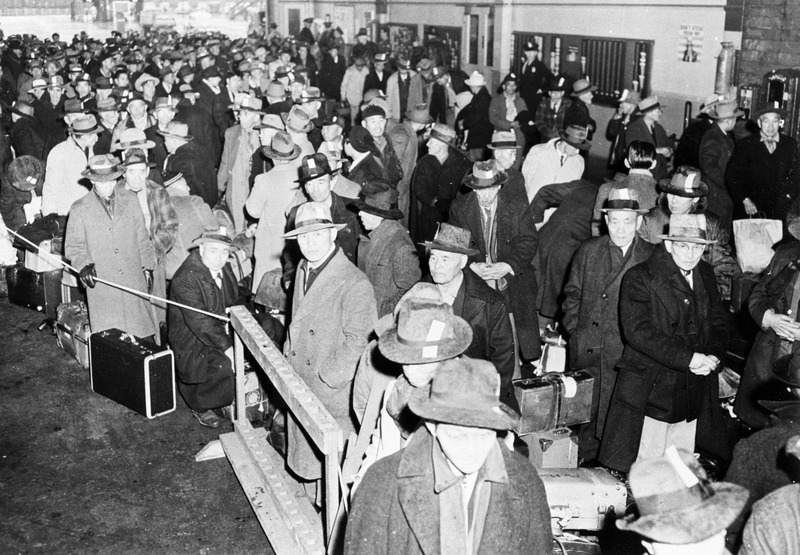Wartime Repatriation
Jackson Ryan
With the outbreak of World War II, many Americans found themselves under scrutiny by the United States Government due to their ethnic ties to nations that were now locked in a brutal conflict with one another. Japanese, Italian and German Americans all had their loyalties questioned, and many were moved into state controlled internment camps to ensure they would pose no threat to the US at war. These Americans born both overseas and even in the United States itself ended up in glorified prisons from Tule Lake California to Crystal City Texas, and had much of their land and property forfeited during their imprisonment. Kept isolated from the rest of the world and watched over closely by guards day and night, many of these Americans would go on to suffer a further insult when the United States Government signed the Denaturalization Act of 1944, allowing any American living in the United States to renounce their citizenship, opening up the avenue for immigration authorities to repatriate them back to their “home” nations. Amongst Japanese Americans alone 4,724 people were sent to Japan during or after the war, a ruined country with which many did not even speak the native language let alone have any cultural connection to.[1] By coercing American citizens to renounce their citizenship under duress so that they may be deported to the Axis powers the US Government lessened the impact of the fight for freedom it was leading around the world in World War II.
In April of 1945, 12-year-old Arthur Jacobs of New York City would be moved alongside his family to the Crystal City Internment Camp in South Texas. Arthur was born and raised in New York and had yet to leave the state when it came time for his family to be transported halfway across the country. He spoke only English and knew very little of his parents homeland, Germany, as his mother and father had moved to the United States in the early 20’s looking for a better life and had little interest in keeping ties with their German roots. Both had learned English before arriving in New York, and both considered themselves Americans first and Germans a distant second. Yet as the war came to a close in the early months of 1945 and an Allied victory in Europe seemed imminent, the United States selected members of it’s foreign-born citizenry to be repatriated back to nations they had left a decade prior. Jacob’s family was just one example of thousands of family’s who “voluntarily” renounced their citizenship and were shipped overseas to the destroyed cities of Europe and Japan and left to their own devices in the ruins to struggle to carve out a living. President Truman had insinuated that those who had been interned as potential enemy aliens, as the Jacob’s family had, would be forcibly deported at wars end and that to avoid a problem it was simply better to agree to move back on their own accord, renouncing their citizenship in the process.[2] These internees’ were unaware of the illegality of such a move, and decided to follow the seemingly sensible second option laid out before them.
For Japanese Americans like Sumi Utusushigawa the problem of repatriation would not be one forced on her due to coercion from the Federal Government, but through her father’s unwavering pride in Japan. Like many Issei in the camp, Sumi’s father Tokiji refused to accept the news presented by their American captors that Japan had capitulated and the war was over. For them such an outcome was impossible, and more than likely an attempt at propaganda by the government that had mistreated them. When the offer to be repatriated back to his home country came, Tokiji quickly accepted and renounced his American citizenship, forcing his wife and children to do the same. In this fashion over 600 Japanese Americans from Crystal City alone were boarded on a train early on December 4th, 1945, to be shipped eastward where a transport would take them overseas to Japan. Many aboard, including Sumi, had been born in the United States and considered themselves Americans with little allegiance to a home country they knew little about much less been to. For the Issei who were excited to return home, a painful dose of reality was all that awaited them when they arrived at the port city of Yokosuka. Expecting a victorious Japan in the midst of a glorious celebration, they instead discovered to their dread that the Americans had been telling the truth, Japan had indeed lost. Japan in early 1946 was a country utterly destroyed by war; much of the civilian infrastructure had failed and food was scarce. Sumi states that her father began to understand the gravity of his mistake: “A part of my dad died that day on the barge, everything he’d believed in was suddenly gone.”[3] For the Issei and their children, this was the start of a grueling rebuilding process in a nation that was no longer their home, if it even ever had been in the first place.
Bibliography
[1]Smithsonian, National Museum of American History. “Loyalty.” A More Perfect Union. Behring Center(Accessed November 12, 2018)
[2]McHorter, Williams. Interview with Arthur Jacobs. Texas in World War II. Texas Historical Commission Interview, April 2010.
[3]Russell, Jan. The Train to Crystal City. New York: Scribner, 2015
Oral History of Arhur Jacobs:
https://www.thestoryoftexas.com/upload/files/Arthur_Jacobs_Transcript_(Copyright_THC).pdf
Arthur Jacobs was seven when the United States entered World War II and lived through his family’s imprisonment at the Crystal City Internment Camp and their subsequent repatriation to Germany at the wars end. Being non-citizen Americans, his parents were reluctant to leave the home they had made for themselves in the United States and found life in post-war Germany difficult. Jacobs describes his experiences in the Crystal City Camp and what it was like to be forced to leave the country of his birth for a foreign one in state sponsored repatriation.
